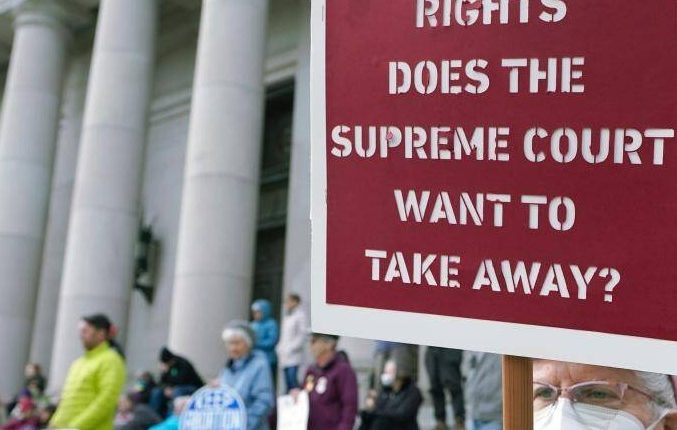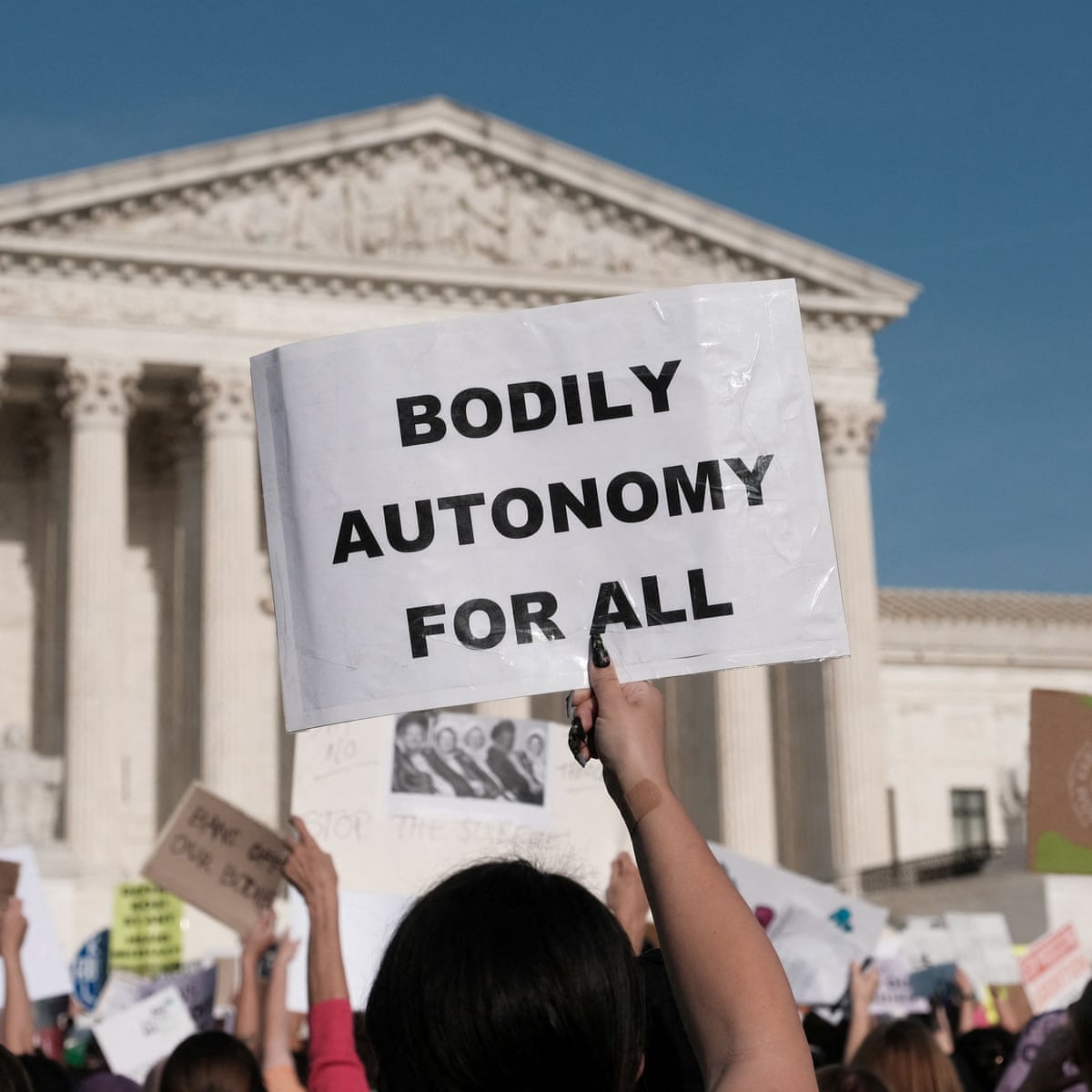A leaked Supreme Court document shows that a right-leaning majority is prepared to overturn the landmark ruling which made access to safe and legal abortions a constitutional right in the US.
On Monday, Politico published a leaked Supreme Court document showing that a majority of the right-leaning court is prepared to overturn 1973’s landmark Roe v Wade decision, thereby nullifying the constitutional right to abortion on the federal level.
Having originally circulated in February, the opinion was written for Dobbs v. Jackson Woman’s Health Organization by arch-conservative Justice Samuel Alito, who declares at one point that ‘Roe was egregiously wrong from the start.’
For this reason, it appears to be near-concrete proof that when the court makes its official ruling (expected some time next month), it will abolish reproductive health rights in the US and drastically change the very fabric of the country’s society to an incomprehensible degree as a result.
So, where did it all begin, what is actually going on, and what is the potential fallout of such a verdict? The picture is complicated, but here’s a breakdown of what we know.

First, some background context
In 1969, 25-year-old Norma McCorvey challenged the criminal abortion laws in Texas under the pseudonym ‘Jane Roe.’
She did so because the state forbade abortion as unconstitutional, except in cases where the mother’s life was in danger.
Defending the anti-abortion law was Henry Wade, the district attorney for Dallas County (hence Roe v Wade). In 1973, her appeal made it to the US Supreme Court, where her case was heard.
She argued that abortion laws in Texas went against the US Constitution because they infringed a woman’s right to privacy.
By a vote of seven to two, the court justices ruled that governments lacked the power to prohibit abortions and judged that a woman’s right to terminate her pregnancy was protected by the US Constitution.
One historian of abortion argues that abortion stays at pretty much the same rate per capita over time whether it's legal or banned. What changes when you make it illegal is how many women die from it.
— Kathleen Belew (@kathleen_belew) May 3, 2022
This set in motion the ‘trimester system,’ giving American women an absolute right to an abortion in the first three months of pregnancy, allowing some government regulation in the second trimester, and declaring that states may restrict or ban abortions in the final trimester as the foetus nears the point where it could live outside the womb.
It also established that in the final trimester, a woman can obtain an abortion despite any legal ban only if doctors certify it is necessary to save her life.
Yet in the 49 years since Roe v Wade, anti-abortion campaigners have regained some lost ground. In 1980, the Supreme Court upheld a law that banned the use of federal funds for abortion except when necessary to save a woman’s life.
A decade later, it approved more restrictions, including allowing states to prohibit abortions at state clinics or by state employees.
Not only this, but it determined that states can restrict abortions even in the first trimester for non-medical reasons.
Consequently, many women today have to travel further for the procedure and pay more for it, with poorer women bearing the brunt.
On this note, this isn’t just about Roe.
Abortion is among a number of fundamental rights that SCOTUS has recognised, which includes contraception in 1965, interracial marriage in 1967 and same-sex marriage in 2015.
Though these rights are not explicitly mentioned in the Constitution, they are linked to autonomy, dignity, equality, and more importantly, personal privacy, notes JD Candidate, Levi Eckman.
Enter: the 14th Amendment.
https://twitter.com/BrynnTannehill/status/1521474143190929412?s=20&t=_v8TLanAMOrOVSKTEK24uA
More commonly known as the ‘equal protection’ clause, it was ratified in 1868 and expanded protections of rights for citizens at the state and federal level. It also extended both civil and legal rights for formerly enslaved Black citizens who were subject to discriminatory state laws.
The 14th Amendment has been invoked in major Supreme Court rulings involving civil rights, such as the 1954 Brown v. Board of Education ruling that found racial segregation of public schools violated the equal protection clause.
It also establishes the right to due process at the state level, often used by the Supreme Court to strike down state legislation that restricts personal liberties and interests not explicitly mentioned in the Constitution, like the right to privacy.
The Roe ruling relied on this clause when it concluded that prohibiting abortion violated a right to privacy under the Constitution by restricting a person’s ability to choose to have an abortion.
The aforementioned landmark legal decisions on abortion, contraception, interracial marriage, and same-sex marriage all fall under the 14th Amendment’s due process clause.
View this post on Instagram
Everything you need to know about what’s happening at present
According to the draft majority opinion written by Alito and obtained by Politico, the Supreme Court has provisionally voted to overturn Roe v Wade, wholeheartedly repudiating the 1973 ruling that enshrined the constitutional right to abortion, and a subsequent 1992 decision – Planned Parenthood v Casey – that largely upheld that right.
It’s the first time in modern history that the public has seen a Supreme Court draft decision while a case was still pending.
If this goes ahead, it would bring about the end of nearly 50 years of federal constitutional protection of abortion rights and state lawmakers would have the power to restrict or entirely ban abortion if they wanted to.
Unleashing chaos on the country, 26 states are certain or likely to ban abortion if and when Roe is overturned (according to the Guttmacher Institute) and in some of the most crucial swing states, ‘trigger laws’ that go back to before the Civil War could immediately be used.

‘We hold that Roe and Casey must be overruled. It is time to heed the Constitution and return the issue of abortion to the people’s elected representatives,’ reads the leaked document.
It also suggests that Roe’s ‘survey of history ranged from the constitutionally irrelevant to the plainly incorrect,’ argues that its reasoning was ‘exceptionally weak,’ and asserts that the decision has had ‘damaging consequences.’
And, adding insult to injury, Alito also appears to pre-empt the backlash by stating ‘we cannot allow our decisions to be affected by any extraneous influences such as concern about the public’s reaction to our work, we do not pretend to know how our political system or society will respond to today’s decision overruling Roe and Casey, and even if we could foresee what will happen, we would have no authority to let that knowledge influence our decision.’





















